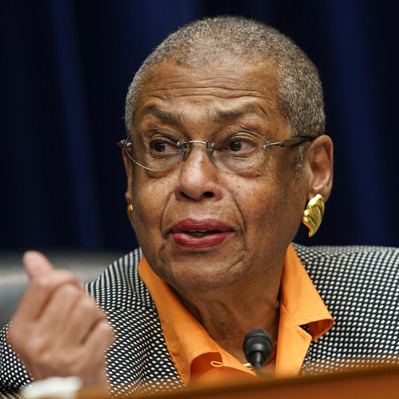Eleanor Holmes Norton is an American politician, lawyer, and human rights activist. Norton serves as a congressional delegate to the U.S. House of Representatives, where she has represented the District of Columbia since 1991 as a member of the Democratic Party.
Prior to serving in Congress, Norton organized for Student Nonviolent Coordinating Committee during the civil rights movement. From 1977 to 1981, she was the first female chair of the Equal Employment Opportunity Commission.
Upon graduation from law school, she worked as a law clerk to Federal District Court Judge A. Leon Higginbotham Jr. In 1965, she became the assistant legal director of the American Civil Liberties Union, a position she held until 1970. In 1970, Norton represented sixty female employees of Newsweek who had filed a claim with the Equal Employment Opportunity Commission (EEOC) that Newsweek had a policy of allowing only men to be reporters. The women won, and Newsweek agreed to allow women to be reporters.
Norton specialized in freedom of speech cases, and her work included successfully arguing Carroll v. President & Commissioners of Princess Anne, a Supreme Court case brought on behalf of the white supremacist National States' Rights Party. She put this victory into perspective in an interview with one of the District of Columbia Bar's website editors: "I defended the First Amendment, and you seldom get to defend the First Amendment by defending people you like ... You don't know whether the First Amendment is alive and well until it is tested by people with despicable ideas. And I loved the idea of looking a racist in the face—remember this was a time when racism was much more alive and well than it is today—and saying, 'I am your lawyer, sir, what are you going to do about that?'" She worked as an adjunct assistant professor at New York University Law School from 1970 to 1971. In 1970, Mayor John Lindsay appointed her as the head of the New York City Human Rights Commission, and she held the first hearings in the country on discrimination against women. Prominent feminists from throughout the country came to New York City to testify, while Norton used the platform as a means of raising public awareness about the application of the Civil Rights Act of 1964 to women and sex discrimination.
President Jimmy Carter appointed Norton as the chair of the EEOC in 1977; she became the first female head of the agency. Norton released the EEOC's first set of regulations outlining what constituted sexual harassment and declaring that sexual harassment was indeed a form of sexual discrimination that violated federal civil rights laws.
She has also served as a senior fellow of the Urban Institute. Norton became a professor at Georgetown University Law Center in 1982. During this time, she was a vocal anti-apartheid activist in the U.S., and was a part of the Free South Africa Movement.
In 1990, Norton, along with 15 other African American women and one man, formed African-American Women for Reproductive Freedom.
She contributed the piece "Notes of a Feminist Long Distance Runner" to the 2003 anthology Sisterhood Is Forever: The Women's Anthology for a New Millennium, edited by Robin Morgan.
She received a Foremother Award for her lifetime of accomplishments from the National Research Center for Women & Families in 2011.




























































